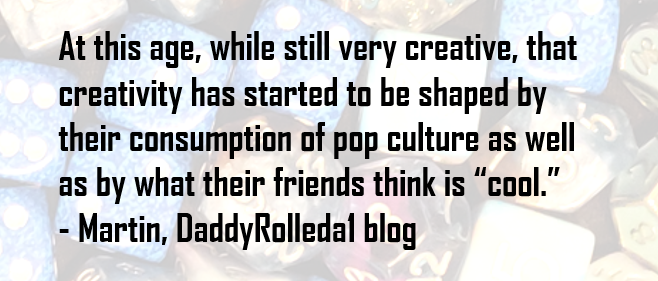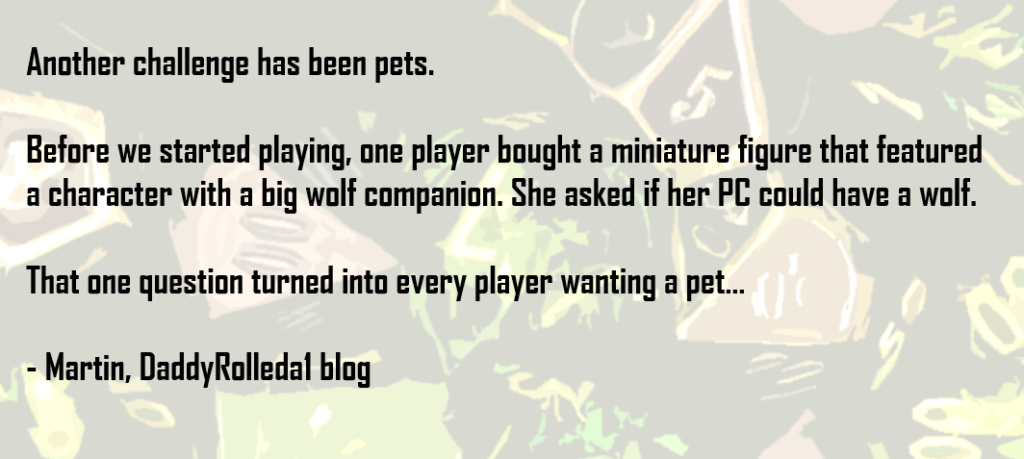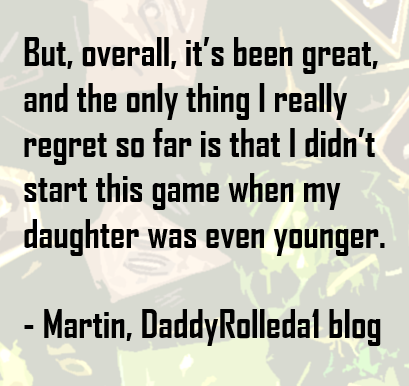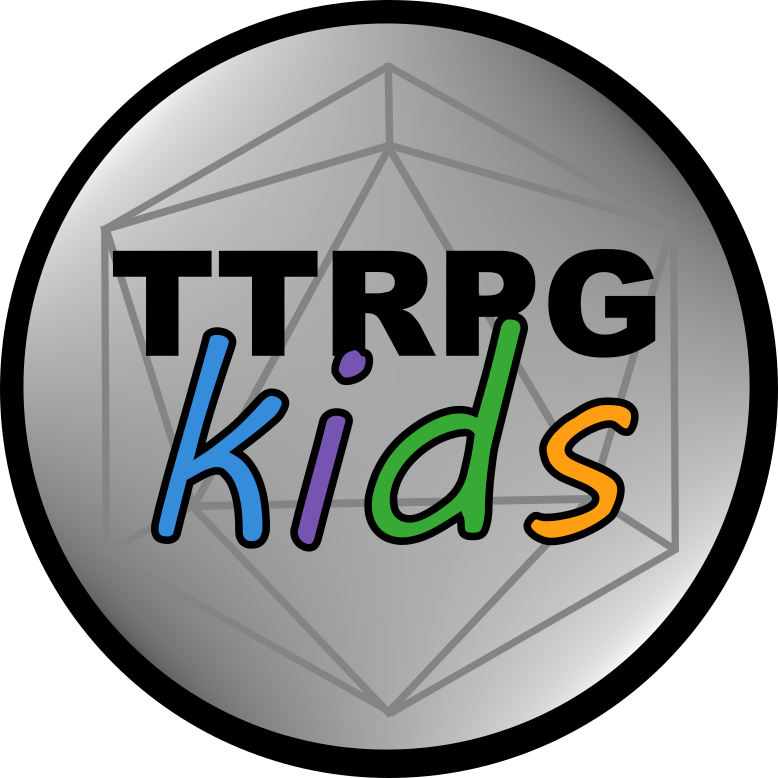The unique joys and challenges of playing tabletop RPGs with kids (part 1), featuring Daddy Rolled a 1!
Jump to:
- Joy: creativity!
- Challenge: juggling extra dynamic stories
- Joy: learning with your kid
- Challenge: developing skills mid-game
- Joy: creating generational connections
- Overall thoughts
The joy of sharing in your kid’s explosive creativity
Steph (TTRPGkids, 4yo player):
When playing tabletop RPGs with my kid, I love it when he comes up with wild stories based on the smallest prompts! Something as simple as asking what a fish looks like leads to a wonderful explanation from my kid about a magical rainbow carp that needs help finding sunken treasure, which becomes the central part of our next quest.
It is not only amazing for me to see my kid’s dynamic imagination at work, but it’s awesome to get to participate as well. We bounce ideas off of each other the whole session, and it has helped me to grow as a storyteller as well.
Martin (DaddyRolledA1, 11 – 13yo players):
I have been running an old-school D&D game for a group of five players ranging in age from 11 years old to 13 (plus one dad). The three remaining kid players are all now 13 (two of them moved this summer).

At this age, while still very creative, that creativity has started to be shaped by their consumption of pop culture as well as by what their friends think is “cool.” As an example, when I first began talking to my daughter about playing, she was around 8 and she wanted to play an Elf called “Jingles”. Sshe drew a picture complete with striped socks and shoes that curled up, like the elves from the Rankin-Bass Christmas specials, . Bbut by the time we started playing, she was 11 years old and her character, while still an elf, was a much more traditional Tolkiensian version.
Creativity at this age is a lot less about coming up with original things, but rather about adapting things they all think are cool (whether it’s “Stranger Things,” or various manga or anime series, etc.).
The challenge of juggling your kid’s extra dynamic stories
Steph (TTRPGkids, 4yo player):
Along with that wonderfully explosive creativity comes the flip side – sometimes the stories can be a bit much to handle! I can’t really plan sessions out too much like I would for a tabletop RPG for grown ups because I know my kid will think of something that I haven’t, so it is 90% improv.
Like I said before, this has made me a better storyteller with it being so dynamic, but it can also be a little exhausting trying to keep up! To work with this, I keep our game sessions a bit short for both my kid’s and my own sake, and I use a rough outline (like the chart in the beginning of StoryGuider) to help keep things on track without railroading my kid’s story.
Martin (DaddyRolledA1, 11 – 13yo players):
In this case, I wouldn’t necessarily say it’s that they’re “extra dynamic,” but rather that, especially at this age, the kids are looking for ways to have a sense of control, and they get extremely frustrated when their PCs do not have that control. I have a witch mentor in my game who has never let the PCs see her – she speaks to them telepathically and she’s quite rude at times. But the players had their characters agree to let the witch teach them the art of magic and they signed a contract to be bound to her for seven years. The witch assigns them menial tasks like scrubbing the floors, foraging for mushrooms, and even emptying her chamber pots. There are severe punishments for disobedience, which the players know. That ends up becoming a frustrating situation for them, because they want to tell the witch off and talk back to her, and often that leads to them completely breaking character and saying things that I know their characters wouldn’t say. So, I have to adapt to that quickly, and remind them to stay in character.
It’s also interesting because of the three kid players I have left, two of them made characters who are their own age (11 or 12 when we started) and the other’s character is only about 15. So, the NPCs in the world treat them as kids, and I think they find that very frustrating. I explained to them when we started that they could make their PCs any age, but they chose to make them the same age as themselves. This directly impacts the sense of control they think their characters should have, because most people in town aren’t going to take orders from three kids, but I also don’t want the one dad player, who plays an adult PC, calling all the shots.

Another challenge has been pets. Before we started playing, one player bought a miniature figure that featured a character with a big wolf companion. She asked if her PC could have a wolf. That one question turned into every player wanting a pet, and they used to take so much time talking about their pets: what their names were, how to feed them, where to house them when they were adventuring, and on and on. The dad player started to get a little frustrated because the kids would spend so much time talking and joking about their pets instead of actually playing. This took a while to solve but I finally created an NPC who has a trained dancing bear. He offered to train all the characters’ pets while they are adventuring in dark dangerous caves, because that’s no place for a couple of wolf pups and a turtle. They check in with him whenever they’re in town, but otherwise the pets don’t play a big role, for now.
The joy of learning with your kid through tabletop RPGs
Steph (TTRPGkids, 4yo player):
I’ve mentioned a couple times how playing tabletop RPGs with my kid has helped me to become a better storyteller – it’s helped me to learn in other ways too! While using tabletop RPGs to teach my kid about SEL or math or any of the number of other topics we’ve covered, it has helped me to revisit some of those as well. Things like remembering to stop and take a minute when I’m getting frustrated (because we ALL get frustrated sometimes) has gotten easier for me too as I’ve practiced it with my kid.
I also have been able to really hone in on where my kid is at socially, emotionally, and academically through playing tabletop RPGs with him. I can see how well he puts what we’ve learned into practice through a consistent(ish) game environment and I can see where he is still working on certain skills.
Martin (DaddyRolledA1, 11 – 13yo players):
I definitely have learned a lot about my daughter specifically in this game and how she interacts with her friends. Usually when she’s hanging out with her friends, we give her space, so we don’t always hear and see everything. I used to volunteer at her elementary school so I would see her sometimes with her school mates, but ever since the pandemic and then her moving to middle school, my interaction with her friends has lessened.
Playing D&D, though, and running the game for them, I’m front and center to see how she responds to certain situations. I’ve learned a lot about her personality and how to read her moods better. I can immediately tell when she’s upset with one of her friends, and then afterward, I can use the discussion of the game to begin broaching the topic with her to find out what specifically is bothering her.
For myself, I’ve also learned how to interact with kids of this age better. They are looking to establish their independence, to prove that they are more mature and can make good decisions using the information they have learned. So, I give them a wide berth to come up with their own ideas of what they want their characters to do and encourage them to be as creative as they can. One of the benefits of using an old-school system like the one I use is that the answer is never found on the character sheet. My players never have their heads down reading their sheets to search for what they can do. Instead, they are looking up, looking at me or the other players, talking things out and coming up with strategies and ideas that I never would’ve thought of.
The challenge of working on developing skills with your kid mid-game
Steph (TTRPGkids, 4yo player):
I started playing tabletop RPGs with my kid when he was about 2.5 years old, and at the time of writing this, he’s 4 years old. With him being so young, there’s certain skills, like counting, reading, etc that he’s still working on and that are critical to some tabletop RPGs. It’s taken a lot of tweaking and puzzling out what works for my kid in particular to be able to play these games together.

That said, it is definitely worth it – by learning to tweak games to fit his needs, we create a foundation for growing a lot of the skills that he’s working on so we can build things up over time. We introduce mechanics gradually, and it has been great motivation for my kid to want to learn math, reading, and even sign language. Modifying games to your kid’s level can be a bit of an extra challenge, especially if they are still working on core skills, but it was good practice for me to be flexible as well.
Martin (DaddyRolledA1, 11 – 13yo players):
What I’ve found at this age is that it’s less about skills like reading or math, for example, although I did share with them the math part at our session zero, explaining statistics and percentages, relating it to baseball stats as a way to try to connect with them.
At this age, the developing skills are, I think, more on the emotional development side. They are learning to deal with changes in their bodies, hormones, and different social structures at school. The three kid players I have left have all known each other since they were at least two years old (my daughter and one player went to daycare and preschool together, so they’ve known each other their entire lives going back to around 3 months old). However, at this point, none of them go to the same school, so D&D is usually the only time they see each other. The challenges of navigating the very awkward middle school social structure becomes exacerbated because they all have this shared history, but they’re not really sharing it together anymore. They all have different friends now that they see much more often, and that has a huge impact on how they interact with each other.
As an example, I had to make a “no phones at the table” rule while we play, because at one point, some of the kids didn’t have phones, and the ones who did were spending the game time on Snapchat with their other friends, then disrupting the game to tell the other players what their new friends were doing. This created a lot of social drama during our scheduled games, so I made a rule that they can’t use their phones during the game. They put them in the center of the table, and we take a short 10 minute break every 60 to 90 minutes so they can check them if they want. What’s funny now is that, after doing this for over a year, they almost never ask for breaks any more and when they do, they seldom check their phones.
The joy of generational connections through tabletop RPGs
Steph (TTRPGkids, 4yo player):
Tabletop RPGs have brought my kid and me so much closer over the past couple years – we’ve learned to work together better, we have a shared hobby, and we have a special time and place for spending time with each other.
I think that sometimes, as a parent, it can be easy during times of stress to fall into “doing mode” where we focus on doing what’s right for our kid and doing what we think they need. This is great and necessary, but… I figured out how to just be what my kid (and I) need too. To be there for my kid, I don’t necessarily have to be doing something, sometimes we just need to spend time together, and tabletop RPGs made me kind of stop and take that time. These games let us just be ourselves with each other in the same space, and I still see my kid as my kid, but I also see him as a person better too.
Martin (DaddyRolledA1, 11 – 13yo players):
This is such a great question and something that just came up recently while having dinner with my wife and daughter. We were talking about the game, and my daughter said that she didn’t realize that the parents were also going to play (we only have one adult player, the dad of her friend, who also plays). I explained to her how when we started, most of the parents were not aware what D&D is or how it was played, so to make sure they were all comfortable, I offered for them to all either join as a player, or at least sit with us to watch. One parent sat and watched our first game and that was enough to make her comfortable, so she’s not returned for that. But one dad player, with whom I have played TTRPGs before, asked if he could join the group.
My daughter was saying she didn’t know why he wanted to play with us, and I asked her, “Do you know why I run this game?”
My wife said, “It’s because you like to write and create things.”
And I said, to my daughter, “No, it’s because, as you get older, you and I have fewer and fewer things in common in terms of music, books, movies, or just things that we can do together. We don’t play Legos any longer, and I don’t read stories to you anymore. You don’t like to go with me to the comic book store for weekly visits now. Your middle school doesn’t do activities that need parent volunteers on campus, so there aren’t any school things I can do with you. But, having this scheduled time once a month to play D&D, this is our thing. This is time that we get to spend together and have something where we interact instead of just watching a TV show or movie. And, I think that’s why your friend’s dad is playing – it gives him a chance to hang out and spend time with his daughter.”

That seemed to resonate with her, and I think she has a better appreciation that I’m not running this game just because I like playing D&D (which, of course, I do), but I’m specifically doing it for her because she’s my daughter and I love her and want to spend time with her.
Overall thoughts on the joys and challenges of playing tabletop RPGs with kids
Steph (TTRPGkids, 4yo player):
Playing tabletop RPGs with young kids can pose a lot of challenges for grown ups who are facilitating a game from the ones listed here to managing attention span, conflicts between siblings or classmates, and more, however, there’s a lot of joy in it too. I’ve seen my kid and myself grow individually, we’ve had a lot of fun being creative and silly, and we’re a stronger family because of it. A lot of this growth and fun came from overcoming some of the challenges that we faced, and I’m grateful for having the opportunity to basically level up in real life by taking this on with my kid!
Martin (DaddyRolledA1, 11 – 13yo players):
Running this game for my daughter and her friends has been the absolute most fun I have had running an RPG in my 41 years of playing the game. I still remember our first session as I started setting the scene and watching that look in the players’ eyes as they became immersed in the game. And, knowing that this is something I’m doing not only with my daughter, but also for her, has also helped me feel better about my relationship to her as she grows older and more independent. It gives her a scheduled opportunity to hang out with friends she doesn’t normally see, while also giving her a chance to be creative, whether it’s through illustrations she does of her character, writing session recaps in the voice of her character, or problem-solving both as an individual and as part of a group.
There are challenges, of course. Sometimes real-life drama invades the game. There have been times when my daughter completely shut-down because she was upset with one of her friends. The attention span of this age group is very difficult to reign in, but it’s never consistent. One day they’ll want to take a break every 10 minutes to get snacks or chat about their other friends or check their phones. Other times, they seem so focused that we can play three hours straight without a real break. Getting them to read and respond to any between-session communications, such as confirming what dates they are available, or asking them to make sure they have leveled-up their characters, is almost impossible.
But, overall, it’s been great, and the only thing I really regret so far is that I didn’t start this game when my daughter was even younger.
Thank you!

Thank you Martin for sharing your insights, and thank you, dear reader, for looking into playing tabletop RPGs with your kid! Please let me know in the comments your thoughts and ideas, and go check out Martin’s blog here for some awesome summaries from games he’s run with his daughter and her friends plus other generally cool articles on tabletop RPGs and check out here for a previous interview with Martin!
If you liked this post, make sure to subscribe to the TTRPGkids monthly newsletter to stay up to date on the latest reviews, tips and tricks, game and podcast list updates, and more! Thank you for playing tabletop RPGs with your kids and sharing this awesome hobby with the next generation!



Thanks, Steph! Love your blog, as always, and also really like the layout and format. Most of all, thanks for asking me to participate in this. I hope folks find it helpful. Cheers!
And thank you! I really enjoyed reading your insights about playing TTRPGs with older kids and comparing to how it’s been with my youngster – you offer great stories and advice, and I couldn’t be happier on doing this collab with you!